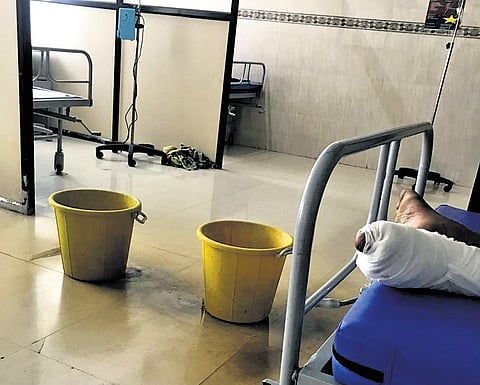

CHENNAI: Patients visiting the Omandurar Government Multi-Super Speciality Hospital may have more than their illnesses to worry about. When TNIE visited the hospital on Saturday, it found that the wards, care units, and even nursing stations were affected due to water seeping from the ceiling. The leak was from pipelines connected to the faulty centralised air-conditioning system and has damaged the false ceiling.
Although the leaked water was being collected in buckets, it was not enough as the floors were still wet. “It increases the risk of falls,” said visitors and patients. Hospital staff said the AC has not been working for years. A staff nurse pointed out that even the nursing station remains wet due to the leak. “It becomes unsafe during busy shifts,” the nurse said.
Sangeetha (name changed), an attendant, said, “The treatment is good, but the infrastructure here is crumbling. The ceiling in most of the rooms in both A and B blocks are damp. For instance, the roof in the attenders’ room on the 6th floor of A block and room number 4047 of the same block are damp. Though air-conditioners are installed, they are not functioning.”
Revathy Jayakamaraj (30), another visitor, expressed concerns about the risk of infection. “My uncle was admitted to the critical care unit in B Block after undergoing amputation due to diabetes. Water was dripping just beside his bed, near the (treated) leg, through a completely damaged ceiling. If the water falls on the amputated area and goes unnoticed, it would lead to severe infection.”
“From the outside, the hospital looks world-class, but the reality is distressing. We even saw garbage being wheeled around using patient stretchers,” she added.
The lack of a proper mobile network coverage adds to the distress. Attenders said mobile signals are weak or completely unavailable inside the hospital. “We are often sent to collect patients’ test reports or provide samples across departments. In emergencies, we can’t even make a call due to the lack of network,” the attender said.
Speaking to TNIE, a hospital official said, “Usually, false ceilings with centralised ACs tend to cause damp roofs within five years. When the building functioned as a secretariat earlier, we could vacate it entirely to replace the damp ceilings. However, now that it operates as a hospital, vacating the building is not feasible. So, whenever we identify a leaking false ceiling, we ensure they are replaced as soon as possible. The leakage issue will only be fully resolved once all non-functional centralised ACs are removed. We are working on it, but it’s a slow process that may take at least two years to remove all centralised units and install split ACs or fans instead.”